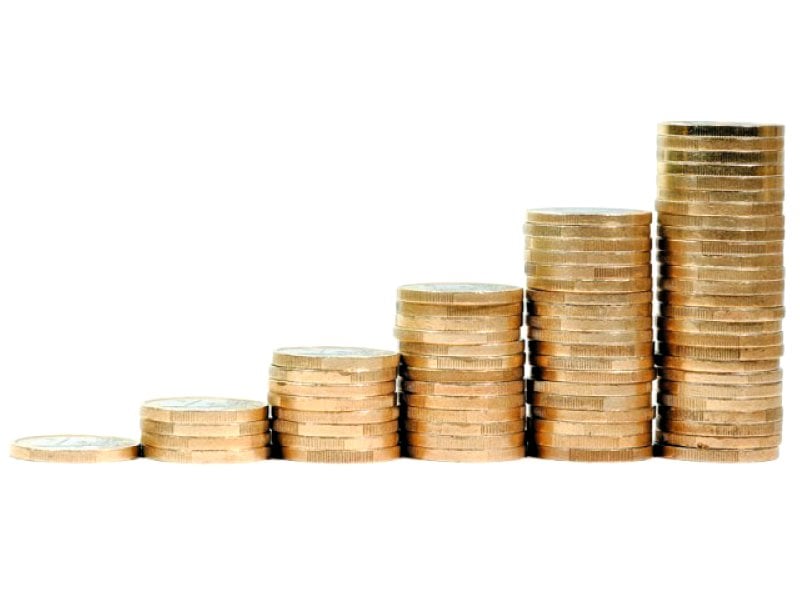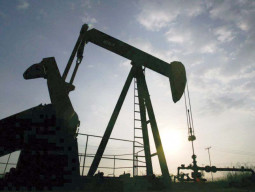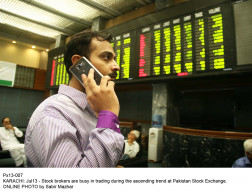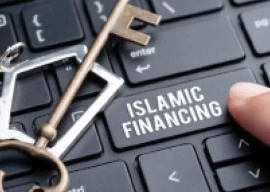
Investors are heading to Pakistan to benefit from a newly-elected, business-friendly government that is rolling out a programme to aid the struggling economy, a recently published Wall Street Journal report said.
In its report on Friday, the American daily said the benchmark index traded in the financial capital Karachi jumped 49.4% last year, ranking among the world’s top performers.
The report said the rally is also part of a broad move by money managers willing to take on high risks in frontier markets across the globe on hopes of juicy returns that beat traditional emerging markets. That bet paid off handsomely in 2013 with countries like Argentina, Venezuela and Vietnam, with histories of volatility and sudden declines, scoring big gains.
The report observed that the biggest catalyst in Pakistan was the election of the PML-N. It is the first time in the nation’s history that an elected government has handed over power to another, raising expectations of improved political stability.
Flows from foreign investors into Pakistan reached $283 million from the beginning of May, the month of the election, to the end of 2013, according to the National Clearing Company of Pakistan. Global investors have also snapped up Pakistani government bonds with yields, which move inversely to prices, falling to 7.54% recently from as high as 11.69% in April on the 10-year bond.
The clearance of almost $5 billion in circular debt, a long-term bailout loan of at least $6.6billion from the International Monetary Fund, and a far reaching privatisation programme which will include the national airline and electricity producers, are all factors the report cites.
All the moves were important given that the country is plagued by electricity shortages, while the oil and gas sector accounts for nearly a third of the benchmark index in Karachi. The largest company on the index, energy firm Oil and Gas Development Company (OGDCL) saw share prices grow 43.5% last year.
“Given that the general impression of the new government has been corporate friendly, it is a very strong factor that has made people more optimistic about Pakistan,” said Mattias Martinsson, chief investment officer and partner at fund company Tundra Fonderin Stockholm, which runs a $30-million Pakistan fund.
For all the gains, however, the size is small with the market capitalisation of the companies listed in Karachi at around $52 billion, according to securities firm Foundation Securities Research. The number pales in comparison to neighbouring India where the companies on the Bombay Stock Exchange are valued at around $1.1 trillion.
“Pakistan, as a market, has very many companies that are trading below their fair value, but as it goes you get distracted by other more important markets,” said Arnout van Rijn, Chief Investment Officer at Robeco Asia Pacific in Hong Kong, which manages the $1.2-billion Robeco Asia-Pacific Equities fund.
The market remains cheap even after the strong run-up earlier this year, currently trading at over nine times trailing 12-month earnings – a common valuation measure used by stock analysts.
“Pakistan has a fairly diverse economy with a large and young population that needs to be fed and supplied basic infrastructure such as electricity,” said Caglar Somek, global portfolio manager at Caravel Management in New York, which manages around $650 million.
“If you find the companies that supply those basic needs, growing at double digit with high profitability, you can buy them at valuations that are on average 30% to 40% cheaper than their emerging market peers,” said Somek.
The market has been up since the end of 2008, however, with shares soaring 329% near the end of 2013 − despite the country being hit by terrorism, the economy nose-diving, and Karachi suffering law and order situation during that period.
“When you have to deal in this kind of environment, I think you have to be extremely good at management to survive,” said Thomas Vester, fund manager at Lloyd George Management, who runs the firm’s frontier market investments, and manages assets worth $656 million as of October 31, 2013.
Published in The Express Tribune, January 5th, 2014.
Like Business on Facebook, follow @TribuneBiz on Twitter to stay informed and join in the conversation.
COMMENTS (32)
Comments are moderated and generally will be posted if they are on-topic and not abusive.
For more information, please see our Comments FAQ



1731655243-0/BeFunky-collage-(61)1731655243-0-165x106.webp)













@Maria: I don't know what world you live in, but please make only informed comments. In Musharraf's time the economic growth and governance was at a much higher standard than in Nawaz's time. This article fails to mention that the $200-$400 million foreign investment they are talking about pales in comparison to the $7-8 billion in Musharraf's time. The emerging markets investments overall are in growth right now, so Pakistan is a small beneficiary of that. Compared to this, in Musharraf's time the Pakistan economic growth of 7%-9% GDP growth took place in a slow world and emerging markets growth. Facts, not mere propaganda please! I encourage you to compare what happened to the foreign reserves levels between Nawaz and Musharraf governments.
One doesn't need this report to prove that the economy is doing better. I visited Pakistan ealrier this year and things are much more upbeat. Obviously whatever Nawaz Sharif is doing is working. Even in the US and Canada people are optimistic about Pakistan.
@Kaleem:
Agreed. I'm no fan of Nawaz Sharif, but his team has a better perspective on economy than PPP or PTI would have.
As far as electricity shortages are concerned, a lot of it can be corrected - at least in major cities where most people can afford to pay for it - by handing it over to an international private firm, because then political and workers' unions (usually the root of the problem) have zero influence over the management. KESC is a proven example of that, they turned themselves around in less than a decade and that too in Pakistan's most volatile city. The same strategy is now being extended to Peshawar's electricity suppliers and I hope it reaches all of Pakistan's major cities. In the absence of a reliable govt infrastructure, privatization is the only way forward.
Not good news. This will only mean more inflation as more liquid cash arrives in the market. Salaried people like me will be crushed. Investors please go away. We like Pakistan the way it is.
Short memory? Pakistan made an open invite to drug smugglers and others wishing to invest/wash their illegally obtained funds. Shame on you.
Let's be optimistic and give chance to this newly elected government, after all zardari got its chance, too. I think most of the things are going b into right direction. We should not forget that most of the decisions which are critical for the betterment of the country are not . Ready to made as US has objection tothat.
Pakistan was getting an FDI of about 7-8 billion US dollars per year from 2002-2007, during the Musharraf regime. The current flow of foreign direct investment is pretty miniscule compared to earlier boom years. Chances are, it will improve in coming years with privatization of few public enterprises and investment in telecom, textiles(due to GST+), oil and gas sector, energy and in cement and steel sector.
Credit goes to the people who have made it happen
I don't think that Pakistan and India is a best comparison to make. Pakistan should be compared to other frontier markets, such as Vietnam, Bangladesh, Cambodia, Philippines, Sri Lanka, etc., etc., which are of more similar size. India is far too big, it should be compared more with China, and maybe Brazil, Indonesia at most. If it is compared with Pakistan, then why not China also be compared to Mongolia, Thailand, Cambodia etc. And why not compare Bangladesh, Nepal etc as well to India.
@Zarb e Hanood: They forgot to mension NSE of India with $1tr captialistion
Joke of the year 2014! Nobody can beat that. Just read a report that Ishaq Dar and his kids invest money in Dubai.
@ Sarmad Hussain Can your old parents recall how long was the loadshedding during previous year? Sir, In smaller cities it used to be upto 22 hours. Even in bigger cities it was no less than 8 hours. Why the long dictatorship of Musharraf and then his NRO-beneficiary PPP did not do anything significant about increasing power supply in the country? No mega Dam has been constructed in Pakistan after Ghazi-Barotha project in late 1990s and no mega power project has been commenced during these 2 tenures except for most-expensive Rental Power Plants since 2006 that have involved kickbacks of Billions of Ruppees and were ultimately struck down by the Supreme Court in 2012.
@Gp65: Bro...i m not a financial guy and honestly couldn't understand all the figures mentioned above...but in a nut shell it is clearly shows that Pak economy is moving in a right direction and will grow more in coming few years...our economy has little or no comparison to indian economy at the moment but u should not ruled out the reality that Pak is an emerging economy..i m optimistic about the bright future of my country and its not a bad thing at all to be optimistic
@Gp65: "PE multiples from investment in Pakistan would be much higher to compensate for the increased risk. Hence your assumption that Pakistan market is undervalued cannot be supported by a smile comparison of PE multiples"
PE ratios are not the only valuation methods used by investors. Secondly you are assuming that the risks are not incorporated into the valuations based on the PE ratios across Pakistan and other traditional markets. Do you undertake investments based on mere assumption or sound analysis of actual data ?
BTW the emerging markets term was used in the article on WSJ and not ET.
@Sarmad Hassan: would you also be kind enough to tell us that what was the duration of load shedding in your posh area from 2010-2013......
How can they compare KSE with BSE & NSE!? There are two stock exchanges in india for your kind info.. BSE- $1.1 tr NSE- $ 1 tr captialistion Total Indian economy $1.8 tr(2012) with 300 bn forex reserves! And KSE - $53 bn only Pakistan's frnd china is biggest loser in 2013 with -7% decline in shangai comp. FII invest 400 million only and kse up by 40% this shows depth of KSE.
@Gp65 "Global investors invested a net $400 million in Pakistan in comparison to an amount 50 times higher I.e. $20billion in India in 2013 which is much more than the ratio of the difference in poplations i.e. 6.5"
Your argument is absurd. The title does not require a comparison with India to be valid. In fact it is motivated by comparison to the previous year and what has transpired before. But I do understand why India was shoved into your argument.
This is hot money... will come make a buck and move on. its not a sustainable growth you will see. the frontier market funds function in this way and they cause major swings in bourses!
From the ET article: “market capitalisation of the companies listed in Karachi at around $52 billion, …………….. pales in comparison to neighbouring India where the companies on the Bombay Stock Exchange are valued at around $1.1 trillion.”
+++++++++++++++++++++++++++++++++
The close to 20X size differential in market capitalisation ought to be an eye opener.
The title is misleading and so is the article. Portfolio inflows are not a true measure of investor-friendliness as they can be liquidates as easily as they come in. Foreign direct investment serves as a better proxy here. Take a look at those numbers and I am sure you wont be all that encouraged. Having said that however, I must say that the present government is not all that bad since they apparently exhibit a progressive mindset.
Good. Best wishes. Wish peace and stability for you as long as you stay within your current borders and just focus on education and economic development.
every coming day is worst to most of Pakistani I could not understand where they are investing and whom are getting jobs? Most of my class mate end up in middle east and west for jobs after engineering degree. I am working one marking job in telecom sector despite that my qualification is not in that field. But due to lack of jobs I have no choice. Millions of young pakistani are with out jobs and that is very serious. Nawaz Sharif must know that is last chance for him, untill it seems He has no vision and team to put country on right path .
Is this a paid advertisement? If investors are flocking here, which industries is it going in and why are the FDI numbers still close to NIL? Also, why are many MNCs still exiting?
This article is severely misleading.... it only talks about some minor funds who are not making fresh investments of any significance ... just recycled stock market trading which is neither here not there. The stock market growth is artificial and caused in part by the depreciation of the rupee.
In future please put paid marketing articles / advertisements in the classified sections of the paper.
@Sarmad Hassan: Well they better! Pakistan needs to move beyond empty slogans such as "Roti,Kapra aur Makkan". People need to realize that they need to make sacrifices and take calculated risks for this country. Days of being a drawing room critic are over. We all must assume responsibility as citizens of this country even though we may have political and other differences.
Yes Pakistan is a land of opportunity but not in the areas under political and bhatta Mafia. I am not naming names but people know why the businesses are moving from south to Punjab in Pakistan.
Mian sb keep it up just focus on deliverance and lessen to critic for their valuable input and ignore the rest.
@Sarmad Hassan: Things are improving in Pakistan but some people still want to complain. Do you really expect Nawaz Sharif to fix 10 years of Musharraf mismanagement and 5 years of Zardari in 200 days? The world is looking favourably at Pakistan so give the guy some credit!
You expect my old parents facing 4 hours of load shedding in the most posh area of my city, to understand this economic yada yada ?
Stability? What stability? It's good to hear pakistan is getting better, but I still feel it is very weak. If we really want to succeed we need a leader like imran khan, otherwise nawaz sharif will loot us for a 3rd term.
NS deserves some credit here. They are deliberately taking difficult decisions in their first year. I suppose that things will ease out in coming years. IMF has also predicted 3.7% growth next year, while Circular debt is almost non-existent. I feel satisfied about Pakistan's direction. Energy policy and its implementation of this govt must be appreciated. If bhasha, Dasu and Gaddani projects are materialized, they will add up to 15000 MW. If LNG import from Qatar is finalized, it will hopefully bring an end to CNG and gas loadshedding. Long way to go NS, dont feel complacent at any stage.